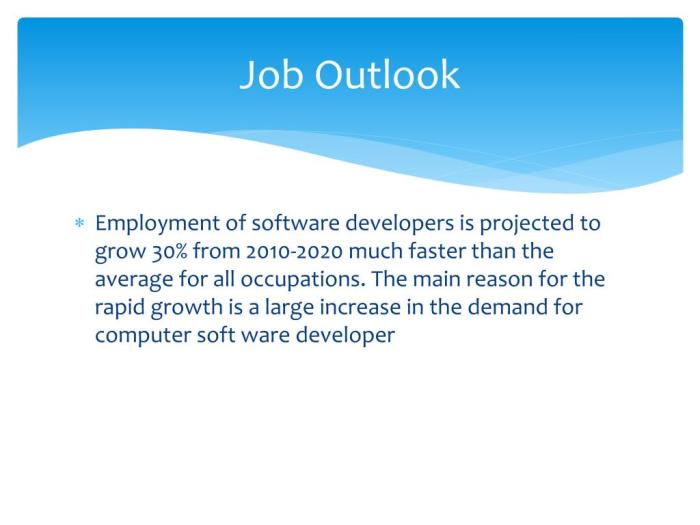Job Outlook Software Developers
Job outlook software developers is crucial for aspiring professionals and experienced developers alike. The tech industry is dynamic, and understanding current trends and future projections is essential for navigating this landscape. This guide explores the current job market, highlighting key skills, salary expectations, and career paths within software development. It delves into the demand for various specializations, from web development to data science, providing insights into emerging trends and the importance of continuous learning.
This in-depth analysis provides a roadmap for understanding the evolving demands of the software development job market. It examines the necessary skills and technologies, educational paths, job search strategies, and salary expectations, enabling readers to make informed decisions about their careers.
Overview of the Job Market for Software Developers
The software development field is experiencing a period of significant growth and transformation. Demand for skilled professionals continues to rise, driven by the increasing reliance on technology in various sectors. This dynamic environment presents both opportunities and challenges for aspiring and experienced developers alike.The demand for software developers is not uniform across all specializations and regions. Emerging technologies and industry trends influence the specific skills most in-demand.
Understanding these trends is crucial for individuals seeking to navigate the job market effectively.
Current Job Market Trends
The current job market for software developers reflects a strong overall demand. Web development remains a significant sector, with a focus on responsive design, user experience (UX), and front-end frameworks like React and Angular. Mobile app development, particularly for iOS and Android platforms, continues to be a crucial area with increasing demand for cross-platform solutions. Data science, driven by the growing need for data analysis and interpretation, is also witnessing a surge in demand.
The development of cloud-based applications and the use of AI are influencing the specialization needed, requiring developers to be adaptable and acquire new skills.
Projected Growth Rate and Demand
Projected growth rates for software developers vary by region and specialization. Areas with a robust technological infrastructure, such as the United States, Europe, and parts of Asia, are expected to see continued high demand. Emerging markets are also experiencing rapid growth in the need for software developers, driven by the expansion of digital businesses and services. For instance, countries in Southeast Asia are attracting significant investments in technology, fostering opportunities for software developers specializing in mobile application development.
Specific growth predictions often rely on factors such as economic forecasts, technological advancements, and the adoption of new technologies within particular sectors.
Skills and Experience Employers Seek
Employers prioritize candidates with a blend of technical skills and soft skills. Technical expertise in programming languages (e.g., Python, Java, JavaScript), frameworks (e.g., React, Angular, Spring Boot), and specific development methodologies (e.g., Agile) are crucial. Problem-solving abilities, strong analytical skills, and the ability to work effectively in teams are highly valued soft skills. Adaptability and a willingness to learn new technologies are also essential given the rapid pace of innovation in the field.
Experience with cloud platforms like AWS, Azure, or Google Cloud is increasingly sought after, demonstrating adaptability and knowledge of contemporary development environments.
Average Salaries for Software Development Roles
| Job Role | Average Salary (USD) |
|---|---|
| Junior Software Developer | $60,000 – $80,000 |
| Senior Software Developer | $90,000 – $120,000 |
| Web Developer | $65,000 – $95,000 |
| Mobile App Developer | $70,000 – $100,000 |
| Data Scientist | $95,000 – $150,000 |
Note: Average salaries are approximate and can vary based on location, experience, specific skills, and company size.
Skillsets and Technologies in Demand

Source: kinsta.com
The software development landscape is constantly evolving, demanding adaptability and proficiency in a diverse range of skills. Staying abreast of the most in-demand technologies is crucial for developers to remain competitive and secure promising career paths. This section will delve into the current and projected needs for programming languages, frameworks, cloud computing, and the indispensable soft skills necessary for success.
Programming Languages and Technologies
The job market consistently favors developers proficient in several key programming languages. Java, Python, and JavaScript remain dominant forces, with Java excelling in enterprise applications and backend systems, Python’s versatility extending across data science, machine learning, and web development, and JavaScript’s ubiquity in front-end web development. These languages, along with their associated frameworks and libraries, form the backbone of modern software solutions.
Popularity and Future Prospects of Frameworks and Libraries
The popularity of specific frameworks and libraries fluctuates based on evolving development trends and project requirements. React, Angular, and Vue.js are prominent front-end frameworks, each offering unique approaches to building user interfaces. Spring Boot and Laravel are leading backend frameworks, known for their efficiency and ease of use in building robust web applications. The continued demand for these technologies suggests their future relevance in software development.
Importance of Cloud Computing Skills
Cloud computing has become an integral part of modern software development. Skills in cloud platforms like AWS, Azure, and Google Cloud are highly sought after. These platforms offer scalability, flexibility, and cost-effectiveness, allowing developers to deploy and manage applications more efficiently. The increasing reliance on cloud-based solutions signifies the growing importance of cloud computing skills for developers.
Skills Needed for Various Software Development Roles
The specific skillsets required vary depending on the role. For example, a front-end developer typically needs strong proficiency in JavaScript frameworks, while a backend developer often focuses on server-side languages and databases. A data scientist requires knowledge of data manipulation tools and machine learning algorithms.
| Role | Essential Skills |
|---|---|
| Front-End Developer | HTML, CSS, JavaScript, React, Angular, or Vue.js |
| Back-End Developer | Java, Python, Node.js, Spring Boot, or Laravel, Databases (SQL, NoSQL) |
| Data Scientist | Python, R, Statistical modeling, Machine Learning libraries (scikit-learn) |
| Mobile App Developer | Kotlin, Swift, React Native, or Flutter |
Importance of Soft Skills
Technical proficiency alone is not sufficient in today’s job market. Soft skills, such as communication, teamwork, problem-solving, and time management, are equally crucial. Effective communication allows developers to clearly articulate their ideas and collaborate effectively with team members. Strong problem-solving abilities are essential for identifying and resolving technical challenges. Time management skills enable developers to meet deadlines and prioritize tasks efficiently.
These soft skills are highly valued by employers and are essential for success in any software development role.
Educational Paths and Certifications

Source: gamedevacademy.org
Aspiring software developers have diverse pathways to embark on their careers. Formal education, intensive boot camps, and self-directed learning all offer viable approaches. The choice often depends on individual learning styles, financial resources, and desired specialization. Certifications play a crucial role in validating skills and enhancing career prospects. Continuous learning is essential for staying current in the ever-evolving tech landscape.Choosing the right educational path is crucial to building a successful software development career.
This path can include formal degree programs, intensive boot camps, or self-directed learning. Each method has its own strengths and limitations, impacting the developer’s skillset and future job opportunities. Regardless of the path, continuous learning and practical experience are vital for success.
Common Educational Paths
A variety of educational routes lead to a career in software development. Formal degree programs, typically bachelor’s degrees in computer science, provide a structured curriculum encompassing fundamental programming concepts, data structures, algorithms, and software design principles. These programs often offer opportunities to specialize in areas like web development, mobile app development, or data science. Alternatively, intensive boot camps provide focused training in specific technologies, allowing individuals to quickly acquire practical skills for immediate job market entry.
Self-directed learning, using online resources and personal projects, is also a viable option, especially for those seeking a customized learning experience or already possessing a foundation in programming.
Value of Certifications
Certifications validate specific skills and knowledge in software development, demonstrating proficiency in particular technologies or methodologies. For example, certifications from industry-recognized organizations like Microsoft, AWS, or Google can boost a developer’s credibility and increase their earning potential. These credentials can also indicate the developer’s ability to apply their knowledge to real-world scenarios. They can prove particularly valuable for those seeking specific roles, such as cloud computing or data analysis.
Importance of Continuous Learning
The software development field is constantly evolving. New technologies, frameworks, and programming languages emerge frequently. Software developers must embrace continuous learning to stay current with these changes and remain competitive. This includes attending workshops, reading technical publications, participating in online communities, and actively pursuing advanced certifications. Staying updated on current trends in the industry is essential to maintain relevance and proficiency.
Top Online Courses and Resources
Numerous online platforms offer valuable resources for software development skill enhancement. Platforms like Coursera, Udemy, and edX provide a wide range of courses, from introductory programming concepts to advanced topics like machine learning. Specific online communities, forums, and tutorials dedicated to particular programming languages and frameworks offer further avenues for skill development.
Role of Practical Experience
Practical experience significantly shapes a developer’s career trajectory. Building personal projects, contributing to open-source projects, and gaining experience through internships or entry-level positions provide invaluable hands-on practice. These experiences allow developers to apply their knowledge, solve real-world problems, and build a portfolio of projects that showcase their abilities to potential employers. This practical experience is crucial for demonstrating competency and adaptability in the job market.
Job Search Strategies and Career Advancement
Securing a software development role and advancing your career requires proactive strategies beyond simply applying for jobs. A well-defined approach, encompassing online presence, tailored application materials, and robust networking, is crucial for success in this competitive field. Effective job searching involves understanding the market dynamics, highlighting your skills, and building relationships.A successful job search strategy in software development is not just about finding a job; it’s about finding the right job for your career goals.
This involves understanding your skills, interests, and the evolving demands of the industry. It’s essential to tailor your approach to specific roles and companies, showcasing your unique value proposition.
Effective Job Search Strategies
A strategic approach to job searching in software development involves more than just submitting applications. It necessitates thorough research, targeted applications, and proactive networking. Understanding the job market, researching companies, and tailoring your application materials are critical steps. A robust online presence and a well-crafted resume and cover letter are vital components of this process.
- Targeted Job Application: Thoroughly research companies and roles to identify those aligning with your skills and career aspirations. Consider the specific technologies, methodologies, and project types emphasized in the job descriptions. This allows you to tailor your application materials to resonate with the hiring manager’s needs.
- Online Presence Management: A strong online presence is paramount. A professional portfolio showcasing projects, a well-maintained LinkedIn profile highlighting your experience and skills, and active participation in relevant online communities can significantly increase your visibility to potential employers.
- Resume and Cover Letter Tailoring: Customize your resume and cover letter to each job application. Highlight relevant skills and experiences, emphasizing how your qualifications match the specific requirements Artikeld in the job description. Use action verbs and quantifiable results to showcase your impact.
Importance of Networking
Networking is an essential aspect of career advancement in software development. Building relationships with professionals in the field opens doors to new opportunities, insights, and mentorship. It’s a two-way street; networking not only helps you find jobs but also provides valuable connections for future career growth.
- Industry Events and Conferences: Attending industry events and conferences provides excellent opportunities to network with professionals, learn about emerging trends, and discover potential job openings. These gatherings often feature workshops, presentations, and networking sessions designed to connect individuals.
- Online Communities and Forums: Online communities and forums dedicated to software development offer valuable networking opportunities. Active participation in these platforms allows you to connect with peers, share knowledge, and stay updated on industry trends.
- Mentorship Programs: Engaging in mentorship programs can accelerate your career growth. Mentors provide guidance, support, and insights into navigating the industry’s complexities. Mentorship often provides a crucial bridge between your current experience and desired future career trajectory.
Career Path Stages
Understanding the typical progression within a software development career allows you to strategize your development. Different stages require distinct skill sets and career goals.
| Stage | Typical Responsibilities | Key Skills | Potential Career Goals |
|---|---|---|---|
| Junior Developer | Executing tasks, learning code, following instructions | Fundamental programming skills, debugging, teamwork | Improving technical skills, gaining project experience |
| Mid-Level Developer | Taking ownership of tasks, leading small projects, mentoring junior developers | Problem-solving, technical leadership, project management | Expanding skill set, leading teams, managing projects |
| Senior Developer | Designing, leading, and executing large-scale projects, mentoring teams | Technical expertise, leadership, strategic planning | Architecting systems, guiding teams, impacting company strategy |
| Technical Lead/Architect | Designing and overseeing complex systems, leading large teams, driving innovation | Deep technical knowledge, strong leadership, architecture principles | Creating innovative solutions, shaping industry standards |
Emerging Trends and Future Outlook: Job Outlook Software Developers
The software development landscape is constantly evolving, driven by technological advancements and shifting business needs. This section explores key trends shaping the future of the field, focusing on the roles of AI, cybersecurity, and automation, and highlighting emerging technologies.
Artificial Intelligence and Machine Learning in Software Development, Job outlook software developers
AI and machine learning are rapidly transforming software development, automating tasks, improving code quality, and accelerating development cycles. AI-powered tools are now capable of generating code, testing software, and even identifying potential bugs, thereby increasing developer productivity and reducing errors. Machine learning algorithms can analyze large datasets of code to identify patterns and suggest improvements, leading to more efficient and optimized software solutions.
For example, AI-driven code completion tools can significantly speed up development time.
Importance of Cybersecurity Skills
The increasing reliance on software systems necessitates a strong focus on cybersecurity. Software developers play a critical role in building secure applications and systems. Understanding vulnerabilities, implementing security best practices, and adhering to industry standards are crucial for preventing cyberattacks and protecting sensitive data. A robust understanding of security protocols, cryptography, and threat modeling is vital for all software developers.
The rise of sophisticated cyber threats necessitates that software developers integrate security considerations throughout the development lifecycle, rather than as an afterthought.
Impact of Automation on Software Development Roles
Automation is impacting various software development roles, from testing to code generation. While automation may displace some routine tasks, it also creates new opportunities for developers to focus on higher-level tasks like problem-solving, design, and strategic planning. The role of a developer is evolving to one that involves more strategic thinking and collaboration with other technical experts. Developers who adapt to this evolving landscape by embracing automation and focusing on areas requiring human ingenuity and creativity will be better positioned for success.
Automated testing tools, for example, free up developers from repetitive tasks and allow them to focus on more complex aspects of the software.
Examples of New Technologies Shaping the Job Market
The emergence of new technologies like cloud computing, blockchain, and augmented reality (AR) is reshaping the software development landscape. These technologies demand new skills and expertise, creating opportunities for developers proficient in these areas. Cloud-based platforms, for instance, require developers skilled in cloud infrastructure and security. Similarly, blockchain development demands expertise in decentralized systems and cryptographic principles.
Developers familiar with AR and VR technologies are also in high demand, as businesses increasingly leverage these technologies for innovative applications. These technologies are not just trends but are becoming foundational elements of many applications, creating a dynamic job market with ever-changing demands.
Salary Expectations and Compensation

Source: slideserve.com
Software developer salaries are a dynamic reflection of the market’s demand, experience levels, and location. Understanding these factors is crucial for career planning and effective negotiation. A detailed look at salary ranges, compensation structures, and negotiation strategies will provide valuable insights.
Average Salary Ranges
Salaries for software developers vary significantly based on experience and location. Factors like specialized skills, industry sector, and company size also play a role. The following table provides a general overview of average salary ranges.
| Experience Level | Average Salary Range (USD)
|
Average Salary Range (USD)
|
|---|---|---|
| Junior Developer (0-2 years) | $60,000 – $85,000 | €45,000 – €65,000 |
| Mid-Level Developer (3-5 years) | $85,000 – $120,000 | €65,000 – €95,000 |
| Senior Developer (5+ years) | $120,000 – $180,000+ | €95,000 – €150,000+ |
Note: These are approximate ranges and can vary based on specific skills, company size, and other factors.
Salary Benchmark Establishment and Evolution
Salary benchmarks are determined by a combination of factors. Job boards, salary surveys, and industry reports analyze compensation data across various roles and locations. Companies often use these benchmarks to establish competitive salaries. These benchmarks continuously evolve as the demand for specific skills changes and as overall economic conditions fluctuate. For instance, the rapid growth of AI has led to a significant increase in demand for AI-focused developers, resulting in higher salary expectations for these specialists.
Compensation Packages
Compensation packages are more than just a salary. Comprehensive benefits packages are crucial for attracting and retaining talent. Typical benefits packages for software developers often include health insurance, retirement plans (401k, pension), paid time off, and professional development opportunities. Some companies offer additional perks like gym memberships, employee stock options, or flexible work arrangements. The specific benefits offered can vary widely between companies and reflect their overall value proposition.
Salary Negotiation Strategies
Salary negotiations are a critical part of securing a competitive compensation package. Researching the average salary for your experience level and location is essential. Highlighting your unique skills and experience, quantifying your accomplishments, and expressing confidence in your abilities are key elements in successful negotiations. Be prepared to justify your worth and clearly articulate your desired compensation.
Remember that a successful negotiation often involves compromise. Being flexible and understanding the company’s perspective can lead to a mutually beneficial outcome.
Final Thoughts
In conclusion, the software development job market presents both exciting opportunities and challenges. By understanding the current trends, developing essential skills, and pursuing relevant educational pathways, aspiring and current software developers can effectively navigate their careers. This comprehensive guide provides a valuable resource for making informed decisions about career progression, skill development, and salary expectations.













Post Comment